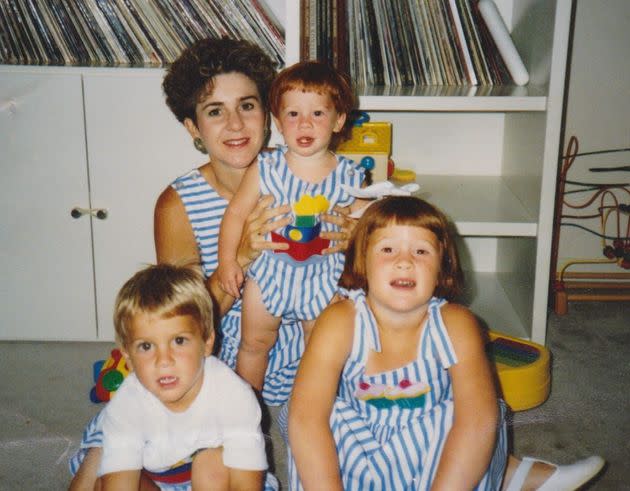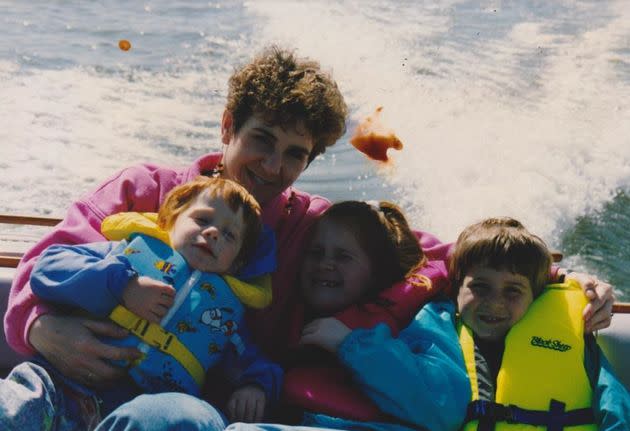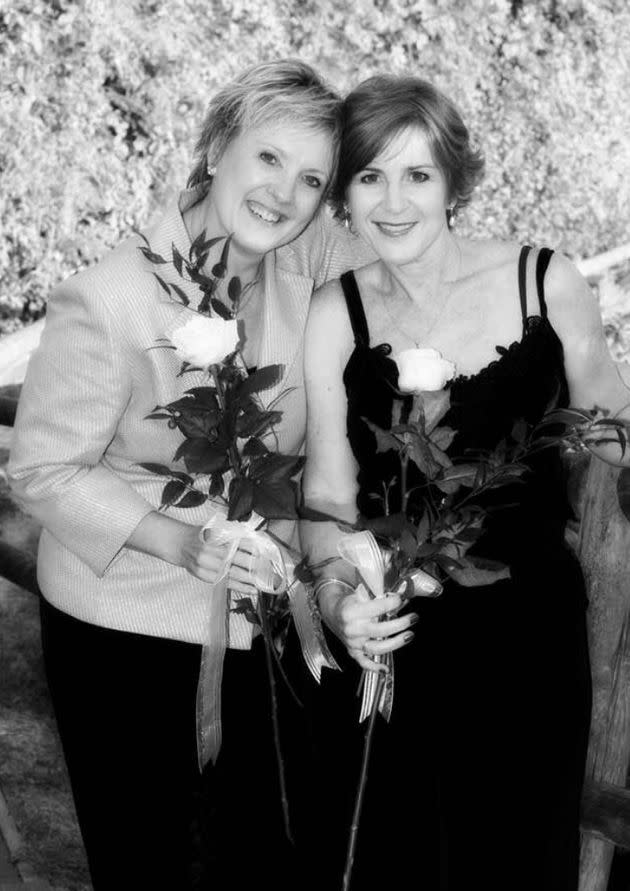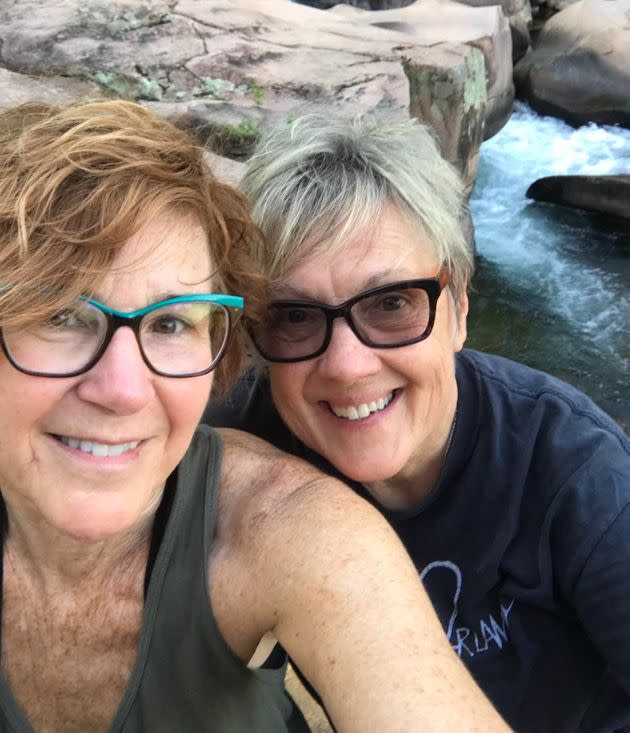Being Gay Made Me An Unfit Parent

The author and her three children, circa 1991. "In retrospect, dressing alike may have reflected my desire to be seen as the perfect family," she writes. "The kids didn’t mind the matching outfits but hated having their pictures taken." (Photo: Courtesy of Nancy Fowler)
In 1998, I nearly lost custody of my three young children. It wasn’t because I was a bad mother. It was because I’m gay.
Only a few decades ago, Missouri law automatically deemed parents like me unfit. The other parent, if there was one, had to be wholly unsuitable for the courts to deny him or her full custody. All the gay parent had to do was be gay.
I didn’t know about these laws when I fell in love with a woman. I didn’t even know I wanted to be with a woman. I didn’t know anything. Psychology calls it denial. My childhood church called the thing I was in denial about “an abomination.” My 1960s Southern upbringing called it but what will the neighbors think.
She was a friend. Every week when the kids were in school, we’d drag rakes or snow shovels from one of our garages and into the yard and hack away at leaves or icy sidewalks. “Eleven!” one of us would yell to the other, and we’d bend forward at the waist spitting out sharp laughter at this private joke. We’d named all our funny sayings and little stories with numbers, thinking it was hilarious to say a word whose meaning was clear only to us. A secret code. Unordered numbers ― 16, 27, four. We thought the randomness made them even funnier. I don’t remember a single saying or story they stood for, only that we would collapse almost violently every time.
Occasionally a neighbor would pull into her driveway or mine. I’d feel my cheeks redden. If it was her house, the neighbor might ask if I owed my friend a favor. I’d explain that, no, I just wanted to help. “How nice!” she might say. I never volunteered that my friend and I also cleaned each other’s houses together every week, and hoped the neighbor wouldn’t drive by again next week or the next. It felt like when I was a child. I’d wriggle up against my older brother’s girlfriends hoping they’d pat me on the head or brush my hair the tender way I brushed my Barbie’s long blonde locks. I would have died if anyone suspected my longing.
She wasn’t the first friend. But she was the first to name what I was feeling: attraction. We kissed. Only once. She didn’t want to do it again, but afterward I could no longer push this abomination from my mind. I still very much cared what the neighbors might think, but I also knew I needed it to happen again, with someone. It felt like life or death.
Did I tell my husband? I did not. Sometimes I wish I had. But our conversations were about the kids’ hockey and dance practices, what’s for dinner and “do you think the babysitter’s available this weekend?” Any words I might use to describe my feelings for my friend were thick glue in my mind. I’d choke on them before they reached my tongue. So, I didn’t tell him. I told no one.
Instead, I took out a personal ad in the local alternative newspaper and called myself Natasha. Looking for a romantic friendship, I wrote because I didn’t know what else to call it. When the replies came, I scribbled names and phone numbers on a piece of paper and stuffed it in my wallet and crammed my wallet into my purse.

The author and her children in a friend’s boat in 1993. "It was thrilling but also scary to wrangle three children while speeding across the Lake of the Ozarks in mid-Missouri," she writes. (Photo: Courtesy of Nancy Fowler)
As I scribbled and stuffed and cheated, family life continued. Chicken and rice for dinner, hockey games and dance performances on the weekends. But as I lived my minivan-mom life with my secret life hidden like crumbs beneath the seats, my husband must have been paying more attention than I thought. When he confronted me with my list of names and numbers, I blurted, “But I have to be touched by a woman.”
It was a desperate plea. I needed two opposing things: to be with a woman and to keep my marriage.
I slept with my new girlfriend when the kids were at school, and with my husband at night. I told myself it all felt good ― great even. I was a good storyteller. I was also a good liar, lying to myself as well as him. I traded pushing down my desire to be with a woman for pushing down my growing distaste over being with my husband. Eventually, his touch felt like sandpaper. But sometimes when I imagined he was her, the rough edges turned to silk.
On New Year’s Eve, when he was asleep, I whispered to my girlfriend on the phone that I wanted us to be a family. I wasn’t even sure what that meant or how I might make it happen. But after that admission, I could no longer sand myself down into someone who could pretend. I’d gone from cheating on my husband to feeling like I was cheating on my girlfriend.
In late January, divorce papers arrived with the shriek of a doorbell. Crisp white pages with many words surrounding a single shocking sentence: “It is in the best interest of the minor children ... that … Petitioner be awarded primary physical custody.”
My husband was the Petitioner. I was the Respondent. I came to understand that if the Petitioner got his way, I’d go from full-time mom to every-other-weekend parent. I also came to understand the Petitioner would probably get his way.
In 1998, there was no thought of same-sex marriage or even civil unions, or even a way for two women or two men to have sex without breaking the law in more than a dozen states including mine. Our illegal sex was called sodomy. People called a person like me “dyke” or “carpet muncher.” The laws of Missouri called me “homosexual” in the legalese that deemed me an unfit parent.

The author and her wife, Cindy Betz, on their wedding day in Vancouver in 2006, nine years before same-sex marriage was legal in the United States. (Photo: Courtesy of Nancy Fowler)
Just five years after I learned I could lose my children, the U.S. Supreme Court decriminalized gay sex by overturning Lawrence v. Texas, 6 to 3. Four Republican-appointed justices — including two tapped by Ronald Reagan — voted with the majority. Twelve years after that, Reagan appointee Anthony Kennedy joined the court’s liberal justices in a 5-4 decision to do what was once unthinkable: legalize same-sex marriage. Both decisions rested on the Constitution’s implied right to privacy. With gay sex and gay marriage legal, any remaining state laws separating gay parents and their children hadn’t a leg to stand on.
The right to privacy also underpinned Roe v. Wade. Three of the Supreme Court justices who overturned Roe this past June in Dobbs v. Jackson Women’s Health Organization were appointed by another Republican: Donald Trump. A different kind of Republican in a uniquely different political time. During confirmation hearings, Trump’s three justices gave lip service to abortion as settled law. Once seated, they voted to overturn it.
In his concurring opinion on Dobbs, long-serving justice Clarence Thomas urged the court to revisit other rights upheld by privacy including contraception and same-sex marriage. In response, Congress is poised to shore up the right to marry. A month after the Supreme Court overturned Roe, the House of Representatives voted to enshrine same-sex and interracial marriage at the federal level. The Senate is expected to vote in September, but passage is not assured.
During the first months of 1998, my days were filled with depositions, attorney meetings and agonizing and scheming over how to get my husband to settle out of court. Couples could make whatever custody arrangements they liked and judges would usually rubber-stamp them. But if the case were to go before a judge without such an agreement ― especially, I was told, the judge we’d been assigned ― it seemed likely the court would invoke legal precedent against gay parents and give my husband the primary physical custody he sought. No matter that I’d been a full-time mom and he’d been the breadwinner for our kids’ entire lives.
As our court date drew closer, I dreamed I was in a murky lake. All around me, kittens, thrashing about, trying to keep their heads above water. When I tried to grab their paws to lift them up, the paws broke off. As the kittens went under, their frightened eyes bored holes into my heart.
Just before our November court date, my attorney faxed me a proposal from my husband’s attorney that we share custody of our children. No court, no judge, all I had to do was sign. I was astounded. I still don’t know for sure what made him change his mind. Maybe the divorce and custody battle had worn him down too. Regardless, relief poured off me in sheets. I didn’t even care the agreement required me to tell my children about my “gay life style” and forbade both of us from living with a partner to whom we weren’t married. Of course, marriage wasn’t possible for me. Under the terms of the decree and existing laws, I’d have to live alone with my children until the youngest was eighteen. A decade.

The author and her wife, Cindy, enjoying a hike in southern Missouri. (Photo: Courtesy of Nancy Fowler)
Over 10 months, the custody battle cost tens of thousands of dollars in attorneys fees. What it cost emotionally is harder to calculate. Living with my husband because my attorney said I couldn’t move without risking custody. The strain of continued family dinners so the children wouldn’t suspect about the divorce. Finally telling the children with vague talk of two houses. The kids gnawing at their fingernails with newly sprouted permanent teeth, pleading to know who they’d live with.
It turns out my 8-, 10- and 13-year-old children did not really care I was gay. They cared about whether they’d still get allowance and whether we’d still have chicken and rice for dinner. We talked about the thorny issues of when and how and if to tell their friends. Some of their peers bullied them for having a gay mom. We talked about that too.
Taking marriage away from same-sex couples would revoke more than 1,000 marital rights including the ability to make medical decisions for spouses and receiving their Social Security. It would chip away at our very personhood, carving out room for a greater degree of discrimination and prejudice that marriage holds at bay. Less apparent is that the fate of the children of gay parents hinges on same-sex marriage. Even for single parents, marriage legitimizes the right to raise one’s children. Mine are grown now, in their 30s. More than two decades after the custody battle, they’re doing meaningful work, partnering and marrying.
LGBTQ+ people now marry, divorce and stumble through relationships and life just like everyone else. We serve in the military. In the last presidential election, voters yawned when a gay candidate talked openly about his husband.
But with the death of the right to choose abortion as part of one’s medical care, with contraception and same-sex marriage twisting in the wind, I worry. Women and others with uteruses could lose the right to plan pregnancy. When I learned I could lose my children, my first thought was, But this is America! as if it couldn’t happen here. But it did happen here ― to many LGBTQ+ parents. And it could happen here again.
Twenty-four years ago, I nearly lost my children. Now, our nation is losing its way. Codifying same-sex marriage would reach beyond the realm of marriage. It would protect parent-child bonds. It would preserve families.
Nancy Fowler is a longtime journalist who’s earned numerous accolades including Emmy and Edward R. Murrow awards. She lives in St. Louis with her wife and two cats, but her Southern roots often draw her back to Birmingham. She’s beginning to write in a more personal voice and is pursuing an MFA in creative nonfiction. Her memoir-in-progress explores how coming out in the 1990s nearly cost her custody of her children but also helped her confront her own prejudices.
Do you have a compelling personal story you’d like to see published on HuffPost? Find out what we’re looking for here and send us a pitch.
This article originally appeared on HuffPost and has been updated.
